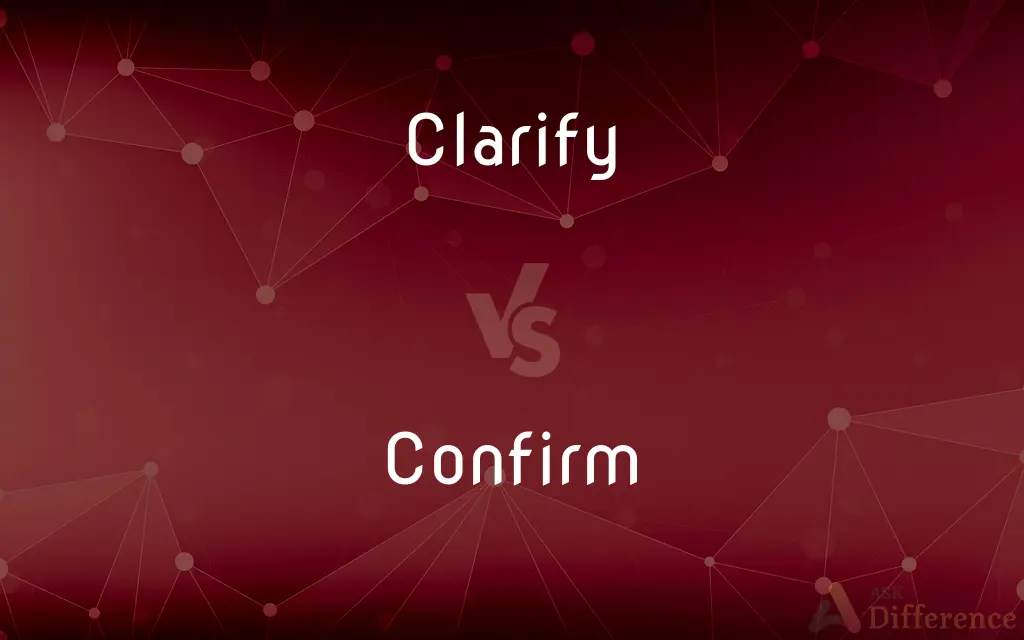Clarify vs. Confirm — What's the Difference?
Edited by Tayyaba Rehman — By Maham Liaqat — Updated on March 28, 2024
Clarify involves explaining or making something more understandable, while confirm is about verifying the truth or accuracy of something.

Difference Between Clarify and Confirm
Table of Contents
ADVERTISEMENT
Key Differences
Clarify is the process of making something less confusing or more comprehensible. It often involves providing additional information or explanation to ensure understanding. On the other hand, confirm is the act of validating or verifying something to establish its truth or accuracy. Confirmation typically requires evidence or agreement to prove that something is correct or as expected.
While clarification seeks to resolve ambiguity or misunderstanding by elaborating on details or simplifying complex information, confirmation seeks to establish certainty about something that might already be understood but requires verification. For instance, one might clarify instructions by breaking them down into simpler steps, whereas confirming might involve checking if the steps were followed correctly or if the desired outcome was achieved.
Clarifying often precedes confirmation in communication processes. Initially, one might need to clarify a request or statement to ensure it's understood; subsequently, one might seek confirmation that the clarified understanding is correct or agreed upon. This sequence underscores the complementary nature of the two actions within effective communication.
In terms of application, clarify is more about the realm of understanding and comprehension, making it crucial in teaching, instructions, or whenever new information is presented. Confirm, however, is vital in scenarios requiring agreement, understanding, or when decisions are based on the accuracy of certain information or actions, such as in contracts, agreements, or scientific validation.
Clarification is inherently a proactive approach to preemptively address misunderstandings or to deepen understanding, often involving questioning, rephrasing, or providing examples. Conversely, confirmation is a reactive measure, seeking assurance that something is understood, agreed upon, or true, often following clarification or as a final step to ensure accuracy and understanding.
ADVERTISEMENT
Comparison Chart
Purpose
To make something understandable or less ambiguous
To verify the truth or accuracy
Action
Explaining, elaborating, simplifying
Verifying, validating, agreeing
Sequence in Communication
Often comes first to ensure understanding
Follows after understanding is assumed, to ensure accuracy
Application
Teaching, instructions, presenting new information
Contracts, agreements, scientific validation
Nature
Proactive approach to deepen understanding
Reactive measure to assure correctness
Compare with Definitions
Clarify
Make clear or comprehensible.
The teacher clarified the concept with a simple diagram.
Confirm
Establish the truth or correctness.
The experiment confirmed the theoretical predictions.
Clarify
Provide additional detail.
The guidebook clarifies the history of each monument with anecdotes.
Confirm
Acknowledge with certainty.
The spokesperson confirmed the dates of the event during the press conference.
Clarify
Remove ambiguity.
The manager asked to clarify the client's requirements through a detailed questionnaire.
Confirm
Verify an agreement or consent.
Please confirm your attendance by replying to this email.
Clarify
Explain further.
The author clarified her statement with an additional paragraph in the next edition.
Confirm
Reaffirm a decision or position.
The board confirmed the company's commitment to sustainability.
Clarify
Simplify a complex topic.
The scientist clarified the theory by comparing it to a well-known phenomenon.
Confirm
Validate a previous assumption or statement.
The findings confirmed the initial hypothesis about climate change.
Clarify
Make (a statement or situation) less confused and more comprehensible
The report managed to clarify the government's position
Confirm
To support or establish the certainty or validity of; verify
Confirm a rumor.
Clarify
Melt (butter) in order to separate out the impurities
Seal the pots with a layer of clarified butter
Confirm
To reaffirm the establishment of (a reservation or advance arrangement).
Clarify
To make clear or easier to understand; elucidate
Clarified her intentions.
Confirm
To make firmer; strengthen
Working on the campaign confirmed her intention to go into politics.
Clarify
To clear of confusion or uncertainty
Clarify the mind.
Confirm
To make valid or binding by a formal or legal act; ratify.
Clarify
To make clear by removing impurities or solid matter, as by heating gently or filtering
Clarify butter.
Confirm
To administer the religious rite of confirmation to.
Clarify
To become clear.
Confirm
To strengthen; to make firm or resolute.
Clarify
(of liquids, such as wine or syrup) To make clear or bright by freeing from feculent matter.
Confirm
To administer the sacrament of confirmation on (someone).
Clarify
To make clear or easily understood; to explain in order to remove doubt or obscurity.
Confirm
To assure the accuracy of previous statements.
Clarify
(ergative) To grow or become clear or transparent; to become free from feculent impurities, as wine or other liquid under clarification.
Leave the wine for 24 hours and it will clarify.
Confirm
To make firm or firmer; to add strength to; to establish; as, health is confirmed by exercise.
Confirm the crown to me and to mine heirs.
And confirmed the same unto Jacob for a law.
Clarify
(ergative) To grow clear or bright; to clear up.
Confirm
To strengthen in judgment or purpose.
Confirmed, then, I resolveAdam shall share with me in bliss or woe.
Clarify
(obsolete) To glorify.
Confirm
To give new assurance of the truth of; to render certain; to verify; to corroborate; as, to confirm a rumor.
Your eyes shall witness and confirm my tale.
These likelihoods confirm her flight.
Clarify
To make clear or bright by freeing from feculent matter; to defecate; to fine; - said of liquids, as wine or sirup.
Confirm
To render valid by formal assent; to complete by a necessary sanction; to ratify; as, to confirm the appoinment of an official; the Senate confirms a treaty.
That treaty so prejudicial ought to have been remitted rather than confimed.
Clarify
To make clear; to free from obscurities; to brighten or illuminate.
To clarify his reason, and to rectify his will.
Confirm
To administer the rite of confirmation to. See Confirmation, 3.
Those which are thus confirmed are thereby supposed to be fit for admission to the sacrament.
Clarify
To glorify.
Fadir, clarifie thi name.
Confirm
Establish or strengthen as with new evidence or facts;
His story confirmed my doubts
The evidence supports the defendant
Clarify
To grow or become clear or transparent; to become free from feculent impurities, as wine or other liquid under clarification.
Confirm
Strengthen or make more firm;
The witnesses confirmed the victim's account
Clarify
To grow clear or bright; to clear up.
Whosoever hath his mind fraught with many thoughts, his wits and understanding do clarify and break up in the discoursing with another.
Confirm
Make more firm;
Confirm thy soul in self-control!
Clarify
Make clear and (more) comprehensible;
Clarify the mystery surrounding her death
Confirm
As of a person to a position;
The Senate confirmed the President's candidate for Secretary of Defense
Clarify
Make clear by removing impurities or solids, as by heating;
Clarify the butter
Clarify beer
Confirm
Administer the rite of confirmation to;
The children were confirmed in their mother's faith
Common Curiosities
What does it mean to clarify something?
To clarify something means to make it clearer, more comprehensible, or less ambiguous, often by providing more information or detail.
What does confirmation involve?
Confirmation involves verifying the truth, accuracy, or validity of something, often through evidence or agreement.
Why is clarification important before confirmation?
Clarification ensures everyone has the same understanding before confirmation is sought, thereby preventing misunderstandings.
How do you confirm something?
Something can be confirmed through evidence, reiteration, agreement, or performing a check or test to ensure accuracy or truth.
What is an example of a situation requiring both clarification and confirmation?
Organizing an event might require clarifying the details of the venue and schedule with the organizers and then confirming these details with the participants.
Can you clarify without needing to confirm?
Yes, clarification can be a standalone process if the goal is solely to improve understanding without needing verification.
Is clarifying more about questions or answers?
Clarifying can involve both posing questions to understand better and providing answers or information to make something clearer.
What role does confirmation play in scientific research?
In scientific research, confirmation is crucial for validating hypotheses, theories, or results through experimentation and evidence.
Can clarify and confirm be used interchangeably?
No, they serve different purposes: clarify is about making something understandable, while confirm is about ensuring something is correct or agreed upon.
Is confirmation always the final step?
Often, confirmation is the final step in processes involving agreements, decisions, or checks, but it can be followed by further actions based on the confirmation.
Can you clarify intentions?
Yes, intentions can be clarified by explicitly stating or explaining them to avoid misunderstandings.
How does one clarify complex information?
Complex information can be clarified by breaking it down into simpler parts, using analogies, or providing examples.
Can confirmation be implicit, or does it need to be explicit?
Confirmation can be both implicit, through actions or context, and explicit, through direct statements or written agreements.
How do clarification and confirmation contribute to effective communication?
Together, they ensure that messages are understood accurately and agreed upon, preventing misunderstandings and fostering clear, effective communication.
Why is confirmation important in legal contexts?
In legal contexts, confirmation is essential to ensure agreements are understood and adhered to, providing a basis for enforceability.
Share Your Discovery

Previous Comparison
Carcinoma vs. Adenocarcinoma
Next Comparison
Merchandising vs. TradingAuthor Spotlight
Written by
Maham LiaqatEdited by
Tayyaba RehmanTayyaba Rehman is a distinguished writer, currently serving as a primary contributor to askdifference.com. As a researcher in semantics and etymology, Tayyaba's passion for the complexity of languages and their distinctions has found a perfect home on the platform. Tayyaba delves into the intricacies of language, distinguishing between commonly confused words and phrases, thereby providing clarity for readers worldwide.














































